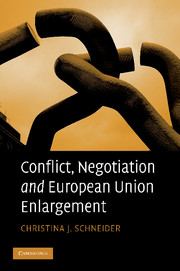Book contents
- Frontmatter
- Contents
- List of Illustrations
- List of Tables
- List of Acronyms
- Acknowledgements
- 1 Introduction
- 2 EU enlargements and transitional periods
- 3 A rationalist puzzle of EU enlargement?
- 4 A theory of discriminatory membership
- 5 EU enlargement, distributional conflicts, and the demand for compensation
- 6 The discriminatory of membership
- 7 Discriminatory membership and intra-union redistribution
- 8 Conclusion
- Bibliography
- Index
2 - EU enlargements and transitional periods
Published online by Cambridge University Press: 17 July 2009
- Frontmatter
- Contents
- List of Illustrations
- List of Tables
- List of Acronyms
- Acknowledgements
- 1 Introduction
- 2 EU enlargements and transitional periods
- 3 A rationalist puzzle of EU enlargement?
- 4 A theory of discriminatory membership
- 5 EU enlargement, distributional conflicts, and the demand for compensation
- 6 The discriminatory of membership
- 7 Discriminatory membership and intra-union redistribution
- 8 Conclusion
- Bibliography
- Index
Summary
Accession negotiations play a key role in the relationship between distributional conflicts, differentiated membership, and the outcomes of the enlargement process. This chapter lays the foundation of the main argument by providing an overview of the formal accession process, the policy instruments used to reconcile conflicts of interest between existing members and applicant countries, and the influence of national politics on the formulation of a common European Union (EU) position by member states. Even this brief overview amply demonstrates the potential for frictions during the enlargement process. It also shows what strategies governments can use to resolve these conflicts to obtain the unanimous approval of member states to admit the applicant countries.
I begin with a short history of the five EU expansions and a description of the formal accession process, which show why accession negotiations should not be treated as a black box. The relative winners of enlargement, the relative losers, and the candidate states bargain over the terms under which accession will take place. The implementation of the acquis communautaire is at the center of these negotiations because it gives the participants an opportunity to redistribute the costs and benefits from accession by agreeing on transitional periods whose terms favor current and future member states that stand to lose most over the short-term. I look at the scope of these measures using the Eastern enlargement round as an example, and show how both EU members and candidate countries can use them strategically to influence the bargaining outcomes.
- Type
- Chapter
- Information
- Conflict, Negotiation and European Union Enlargement , pp. 12 - 32Publisher: Cambridge University PressPrint publication year: 2008

